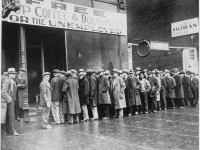An unexpected event such as unemployment is never easy to manage if you don’t have financial reserves to depend on. Even if you do have financial reserves, it is difficult to plan a future around an unemployed situation. Unemployment can occur unexpectedly through a layoff or by getting fired from your job. When this happens and financial resources are limited, you need to know your best course of action in the situation you are faced with. If there are bills that cannot be paid after a prolonged period of unemployment, you can put yourself in a stressful predicament with an unpredictable outcome. One way to take control of the situation is by filing bankruptcy to limit your exposure to creditors who can deplete your financial assets.
What If I Can’t Afford Payments During Unemployment?
A lack of income can force you to fall behind on payments to your creditors. Late payments over 30 days late can cause several issues. Late payments can be recorded on your credit record where it can take time to be removed. A late mortgage payment, credit card payment, auto payment or any other late payment can also result it additional fees. Depending on the policy of the creditor you are dealing with, there can be various amounts of late fees you will be responsible for in addition to the original debts that you owe. There may also be penalties in your rate of interest. Some creditors will raise your interest rate due to late payments. Creditors may also sue you in court to collect on the debt that is owed to them. After a judgment is granted to a creditor, they can levy your bank account or attach a lien to your property. It is important to limit your exposure to such activity when you are unemployed.
What Can You Do To Stop Creditors?
If you know that you have run out of resources to pay your bills and you don’t have any new source of income in sight after you are unemployed, consider bankruptcy to limit your exposure to penalties and collections by your creditors. Creditors are no longer allowed to collect on their debts if they have been discharged in a bankruptcy. A debt can be completely discharged in a bankruptcy if it is an unsecured debt versus a secured debt. Learn more about unsecured and secured debt by clicking here.
What Happens After Debts Are Discharged?
After a bankruptcy, your debts are discharged and no longer able to be collected upon. Creditors cannot call you to collect on debts that were discharged and they can no longer take you to court to recoup payments of interest or principal. Discharged debt can be all unsecured debt that occurred previous to filing a bankruptcy. You will not need to pay any of it back after discharge.
Why Doesn’t Everyone File Bankruptcy On Their Debts?
Bankruptcy is a process and a right that you need to qualify for. A bankruptcy trustee will look at the paperwork filed to make sure that you qualify for the bankruptcy. Although there is no time limit after you are unemployed in order to file a bankruptcy, there are qualifications like income (or lack of income), asset limits (the bankruptcy court will not take all your belongings and assets, but they do have a limit to what you can own while filing bankruptcy). If you are collecting unemployment checks, you may still be able to file a bankruptcy because unemployment checks will not likely be above the allowable income threshold of bankruptcy court.
Check your options with a Chapter 7 or Chapter 13 bankruptcy filing if you find yourself in an unemployed situation and are unable to pay your bills. It may be one of the best strategies for you to keep the cash in hand instead of losing it all to your creditors. You can contact Bankruptcy Law Professionals at 855 257-7671 to schedule a free consultation.

